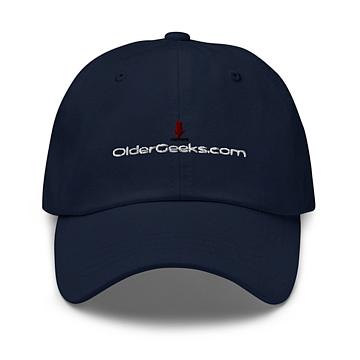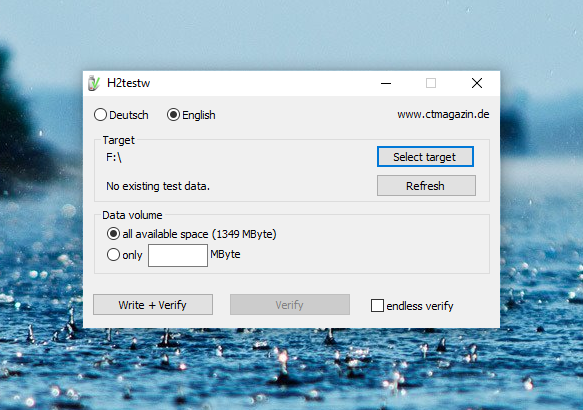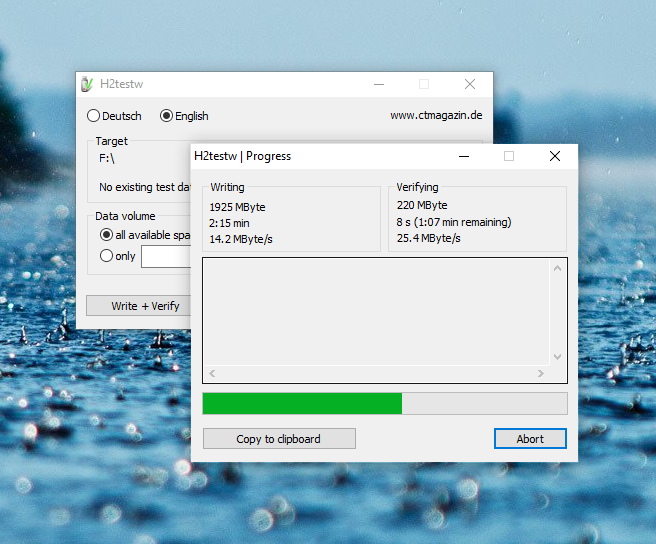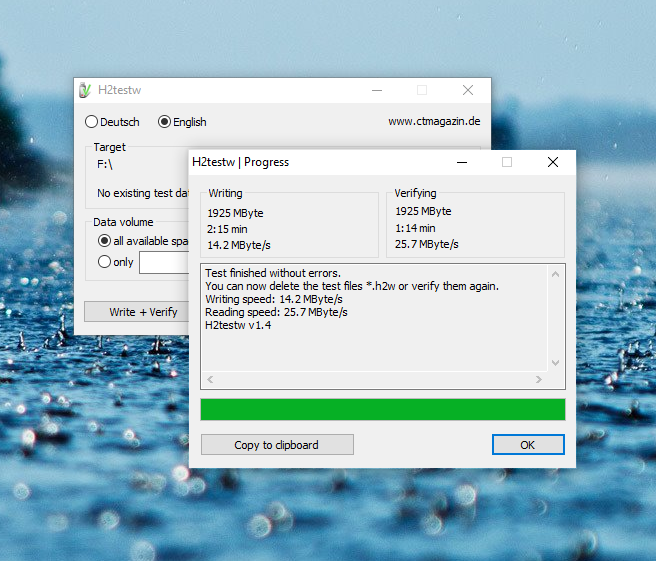|
|

Your download link is at the very bottom of the page... always. |
Processed through Paypal No account required. |
Buy our over-priced crap to help keep things running.










|
|

Your download link is at the very bottom of the page... always. |
Processed through Paypal No account required. |










| File - Download H2testw v1.4 | ||||||||
| Description | ||||||||
|
A plea... Deanna and I have been running this site since 2008 and lately we're seeing a big increase in users (and cost) but a decline in percentage of users who donate. Our ad-free and junkware-free download site only works if everyone chips in to offset the revenue that ads on other sites bring in. Please donate at the bottom of the page. Every little bit helps. Thank you so much. Sincerely, your Older Geeks: Randy and Deanna Always scroll to the bottom of the page for the main download link. We don't believe in fake/misleading download buttons and tricks. The link is always in the same place. H2testw v1.4 Data integrity test for USB sticks and other media. The standard utility for revealing fake-sized USB flash drives. H2testw was developed to test USB sticks for various kinds of errors. It can also be used for any other storage media like memory cards, internal and external hard drives and even network volumes.  The executable file H2testw.exe needs no installation and can be directly run. It will run on Windows XP, Vista, 7, 8, 8.1, 10, 11 and any server version from 2000. How it works The function of H2testw is quite simple: It fills the chosen target directory with test data and then reads it back and verifies it. H2testw does not overwrite or erase any existing data. It doesn't do any low-level tricks so administrator privileges are not required. If your hardware is working properly H2testw will not harm any existing data. BUT... If the hardware is defective then H2testw is designed to find that defect and might as a side effect damage existing files. Therefore: IF YOU SUSPECT A USB STICK OR OTHER STORAGE MEDIA TO BE DEFECTIVE, EMPTY IT AND TEST IT COMPLETELY WITH H2TESTW. Only empty media can be fully tested with H2testw. In order to be able to reproduce the results we recommend to format the media (quick format will do) and then test it. H2testw writes files of up to 1GB to the chosen destination and names them 1.h2w, 2.h2w, 3.h2w and so on. If the target directory already contains such a set of files H2testw will offer to verify them. If there are any other files named *.h2w it will refuse to work. In that case please erase all files *.h2w and hit the Refresh button. After it is done the software leaves it's test files on the medium. You can erase them if you like or verify them again if it's a USB stick, for instance, with another PC. The check box "endless verify" does just that: It puts the verify routine in an endless loop that stops only if an error is found. This is meant to be used as a long-time test to find sporadic data transfer errors. A remark on the estimated time remaining: For intact flash memory the estimate should be pretty exact since it has a constant data rate. With defective media the author has seen massive drops in the transfer rate resulting in the estimate increasing instead of decreasing. Hard drives are slower on the inner tracks than on the outer tracks so when testing a hard drive the estimate is never precise. If you have any questions or suggestions for H2testw please send an email to Harald Bögeholz <hwb@heise.de> (in German or English). What to do in case of errors If H2benchw finds errors while verifying the data it means that the media has not returned all data exactly as it was written. It is likely that the media is defective, but there are other possible causes for data corruption. In case of error you should therefore repeat the test and: Format the media immediately before testing • Don't use USB extension cords. • If testing USB or Firewire devices, try a different port (sometimes USB ports at the back of the PC are better than those at the front). • For external drives try another cable if possible. Error messages When the verifying process detects any errors it outputs some statistics differentiating the various error types: • sectors that have been overwritten by others due to addressing errors (see above) • sectors that have been altered only slightly (less than 8 differing bits per sector) • completely corrupted sectors. In the case of overwritten sectors H2testw tries to find out how much real memory exists in the overwritten area and outputs that amount as "aliased memory" (no guarantee here). Finally, it outputs the offset of the first error with regard to the total amount of test data along with the expected and found value at that offset. Hint: You can copy and paste the error message, for instance to send it in an email. Typical errors he test data of H2testw is made up so as to be able to discern certain typical errors. There are three types: • Addressing errors: When writing a sector its contents are not written to the correct address but overwrite another sector. The author has seen this error on certain manipulated USB sticks. It also happens if you use a hard drive larger than 128 GByte on a machine whose BIOS or OS doesn't know about 48-bit addressing. In this case all addresses are taken modulo 128 GByte. When crossing the 128 GByte boundary you overwrite data at the beginning of the drive. • Data is not saved at all. The author has encountered this with defective USB sticks. Instead of the data written to it a sector returns only ones or zeroes when reading it. This is typical when accessing non-existing memory. • Only few bits of data are changed. That might happen if the connection between the PC and the storage media is faulty. Technical details about the test data H2testw writes data in chunks of 1 megabyte. So even if you choose to completely fill the media you will end up with up to 1 megabyte of free space. Although technically not correct H2testw uses the Windows convention that 1 MByte equals 1024 KByte or 1,048,576 Byte. In order to avoid problems with the 4 GByte limitation of the FAT file system, H2testw begins a new data file after each gigabyte (1024 MByte). Inside a data file each 512-byte sector begins with a 64-bit word (8 byte) containing the offset with regard to the whole data set. It is stored in little-endian format, least significant byte first. So the file 1.h2w begins with: 00 00 00 00 00 00 00 00, the next sector with: 00 02 00 00 00 00 00 00, the next with: 00 04 00 00 00 00 00 00 and so on. The file 2.h2w begins with: 00 00 00 40 00 00 00 00 (offset 1 GByte = 0x40000000). The rest of each sector is filled with a pseudo random number sequence using the offset word as a seed.   Click here to visit the author's website. Continue below for the main download link. |
||||||||
| Downloads | Views | Developer | Last Update | Version | Size | Type | Rank | |
| 950 | 3,982 | Harald Bögeholz <img src="https://www.oldergeeks.com/downloads/gallery/thumbs/H2testw2_th.png"border="0"> | Dec 31, 2023 - 14:50 | 1.4 | 213KB | ZIP |  , out of 29 Votes. , out of 29 Votes. |
|
| File Tags | ||||||||
| H2testw v1.4 | ||||||||
|
Click to Rate File Share it on Twitter → Tweet
|